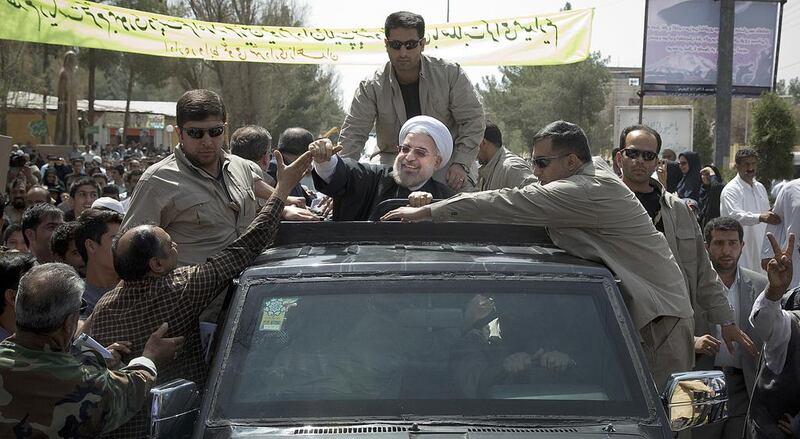Zahedan, Iran // Iran’s president Hassan Rouhani on Tuesday made his first official visit to the volatile Sistan and Baluchestan Province, an underdeveloped region from which he draws massive support.
In a speech at the region’s capital, Zahedan, near the crossroads leading to Afghanistan and Pakistan, Mr Rouhani defended Iran’s nuclear programme and laid out his government’s “numerous plans to develop one of the most underdeveloped provinces” in the country.
From the moment he arrived in the city of 800,000 people, crowds of supporters gathered, many dressed in the traditional robes of the local Baluch population.
They heard Mr Rouhani promise to push development in a province crippled by the highest unemployment rate in the country of 30 per cent, inefficient agricultural practices, lack of access to the public gas network, drought, and an insurgency by Baluch nationalists demanding independence.
Nearly three quarters of voters in Sistan and Baluchestan backed Mr Rouhani, a relative moderate, in last year’s election. Since taking office in August, Mr Rouhani has sought improved ties with the West, which culminated in November’s Geneva interim agreement under which Iran promised to curb uranium enrichment in return for limited sanctions relief from world powers, including the United States.
Mr Rouhani yesterday pledged Iran’s commitment to the talks, saying the Islamic republic “will go forward, step by step, in the negotiations and will prove to the world that what had been said about Iran in the past were mere lies”.
“Iran has never sought and will never seek nuclear weapons,” he said.
Mohammad Nahavandian, the Iranian president’s chief of staff, who was also in Zahedan on Tuesday, echoed Mr Rouhani’s commitment to economic development in Sistan and Baluchestan.
“We can solve our insecurity in the country with economic development. When we create enough job and investment opportunities, then people will support security. Economic development will end corruption and crime,” he said.
Baluchi militants fighting for more autonomy from Tehran are a major contributor to instability in the province, which is home to 1.5 million ethnic Baluchis.
Before Mr Rouhani’s address, young people, many of them unemployed men, chased his motorcade on foot under the burning sun, carrying the pictures of their president and Iran’s flag “to show their unity with the rest of the country”, said Vali Notali, a 40-year-old Baluch tailor.
Despite Mr Rouhani’s popularity in Sistan and Baluchestan, many residents of Zahedan complained about the social and economic problems in the province.
“I have five children, all of them educated but unemployed. We need jobs in this city and the best way for it is to open borders and let us trade with our neighbours. We are so far from Tehran, we cannot trade with the capital,” said Gholamnabi Sarani, 55, a Sunni Baluch.
Although former president Mahmoud Ahmadinejad also paid two visits to the province, people said they are not satisfied with the rate of economic growth.
“All presidents came here, but nothing happened. We are suffering from racial discrimination. Sunnis do not get governmental jobs. But we definitely support Iran’s government, not militants, who get money from outsiders,” said Nematollah Rigi, 32, a driver in Zahedan.
Like other Iranian border provinces, such as Khuzestan and Hormozgan, where Mr Rouhani visited earlier in his presidency, Sistan and Baluchestan, with large populations of ethnic and religious minorities, has historically been distant from the conservative clerical government and its agenda.
But the government is trying to implement new plans such as creating the Chabahar Free Trade-Industrial Zone and taking advantage of the province’s rich mines and petrochemical resources.
These economic opportunities will prevent more people being absorbed by regional militants, said the government.
On Tuesday, more than 4,000 people filled Zahedan’s main sports complex to hear Mr Rouhani deliver the key speech of the visit. Many people handed letters outlining their grievances to Mr Rouhani’s team.
By the end of the day they had gathered 20,000 letters from across the city, according to officials.
Mr Rouhani’s two-day trip of the province will include visits to Zabol and Chabahar.
His schedule in Zahedan included meetings with local Sunni and Shia political and religious leaders, women’s groups, university professors, families of soldiers killed in the war with Iraq, artists, athletes, and scientists.
He also met with the family of Iranian border guard, Jamshid Danaeefar, who was killed by Jaish-ul-Adl, (Army of Justice) a Sunni militant group, after they captured him in early February, while he was patrolling the Pakistani frontier.
Earlier this month, Iran managed to free the four other border guards who were seized in the same ambush, after the group killed Danaeefar.
foreign.desk@thenational.ae





